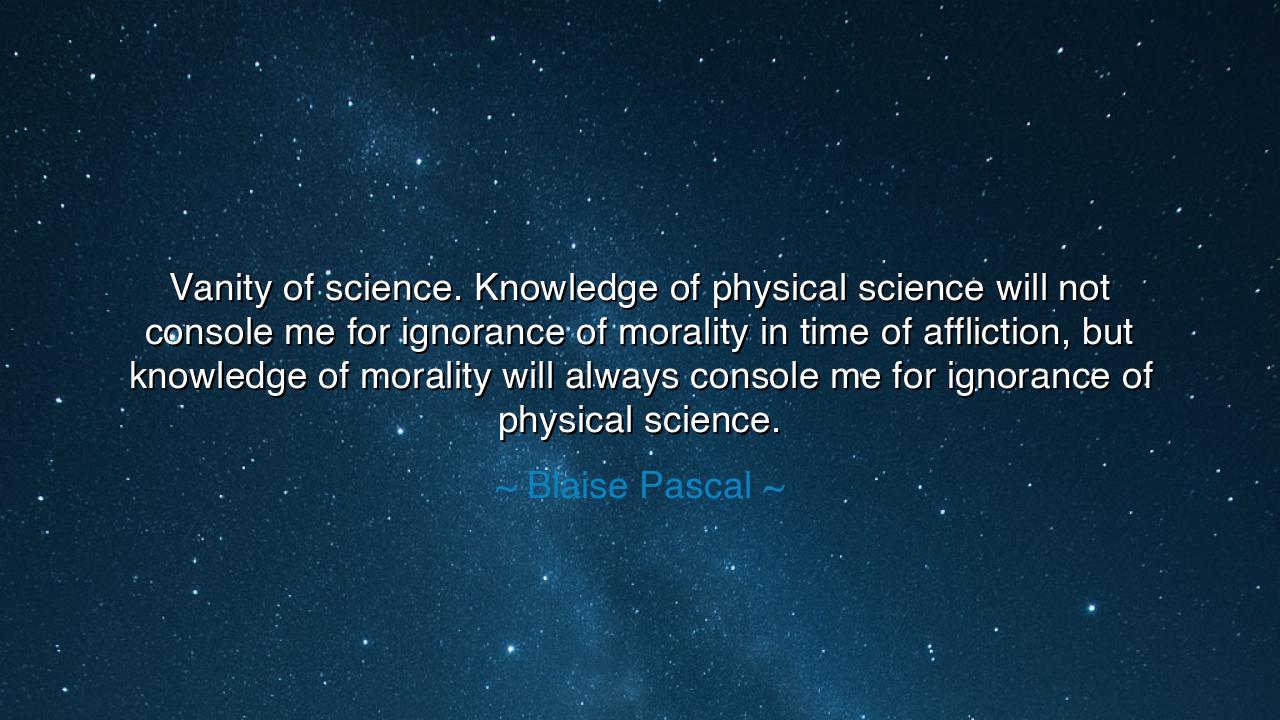
Vanity of science. Knowledge of physical science will not console
Vanity of science. Knowledge of physical science will not console me for ignorance of morality in time of affliction, but knowledge of morality will always console me for ignorance of physical science.






Hear the solemn cry of Blaise Pascal, mathematician, philosopher, and seeker of God, who declared: “Vanity of science. Knowledge of physical science will not console me for ignorance of morality in time of affliction, but knowledge of morality will always console me for ignorance of physical science.” In these words lies the voice of a man who grasped the deepest paradox of human life: that the mind may soar among the stars, yet still remain restless and broken if the heart is untended. For Pascal knew that while science can reveal the workings of the heavens, only morality and spiritual wisdom can steady the soul in its darkest hours.
The origin of this teaching springs from Pascal’s own life. A genius of numbers and discovery, he contributed to geometry, probability, and the very foundations of modern physics. Yet in the midst of his brilliance, he was struck by the weight of mortality and the frailty of human existence. His famous “night of fire” awakened him to the truth that the human heart longs not only for knowledge, but for meaning, for righteousness, for consolation that no equation can provide. Thus, his words are both confession and warning: science without morality is vanity.
Consider the truth of his statement. If a man loses his child or his health, will the laws of motion console him? If a woman faces betrayal or death, will the knowledge of the stars’ orbits heal her wound? Physical science can explain the body, the earth, the sky—but it cannot teach forgiveness, cannot offer hope, cannot bind together the broken spirit. Yet, when one is grounded in morality—in justice, compassion, humility, and love—then even ignorance of the natural sciences cannot rob them of peace.
History itself affirms this. Think of the Stoic philosophers such as Epictetus, a slave who possessed little of worldly learning, yet whose understanding of virtue allowed him to face suffering with dignity. His ignorance of physical science did not weaken his spirit, for he was strong in morality. By contrast, think of the brilliant yet tyrannical minds who mastered science but lacked virtue; their discoveries, when wielded without morality, became tools of oppression and destruction. Knowledge of the world, without knowledge of the soul, often turns against humanity.
Pascal does not despise science, nor should we. He himself was a scientist of the highest order. But he reminds us that science is not enough. To know the weight of a star is wondrous, but to know the weight of kindness is greater. To understand the movement of planets is marvelous, but to understand the movement of conscience is essential. For when affliction comes—as it comes to every life—it is not the formula but the virtue that sustains.
The lesson is clear: pursue science, but never neglect the cultivation of the soul. Let your learning be balanced—seek knowledge of the world, but more urgently, seek knowledge of morality. Nurture compassion, discipline, humility, and love, for these will remain when all else fails. Equip your mind to explore creation, but equip your heart to endure suffering, to give comfort, and to live with dignity.
So I say to you: do not measure wisdom by the breadth of your science alone, but by the depth of your virtue. Let every discovery be tempered by conscience, and let every achievement be guided by love. For as Pascal declared, knowledge of morality will always console, while science alone will leave the soul barren in affliction.
Thus his words endure as both warning and hope: seek science, but seek morality first. For only when the heart is guided by righteousness will the knowledge of the mind serve life and not vanity, truth and not destruction. In this balance lies the true dignity of humanity.






AAdministratorAdministrator
Welcome, honored guests. Please leave a comment, we will respond soon